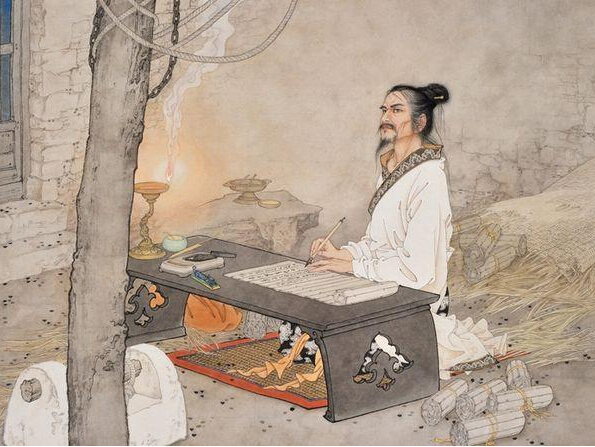(单词翻译:单击)
Sima Qian (145 or 135 B. C~90 B. C.), whose courtesy name was Zichang, was a native of Xiayang (now Hancheng, Shaanxi Province).
司马迁(公元前145或135年~约公元前90年),字子长,夏阳(今陕西韩城)人。
His father Sima Tan served as Taishiling, an official managing the imperial library and calendar. Sima Qian later succeeded his father's work and started compiling Shiji(Or Records of the Historian).
父亲司马谈曾任太史令,司马迁继任太史令后,开始了《史记》的写作。
Unfortunately, Sima Qian was involved in the Li Ling Affair which offended the emperor, who sentenced him to castration.
后因李陵事件蒙冤,被处以宫刑。
Released from the prison, he was appointed Zhongshuling, the imperial secretary-general and was determined to complete his great work.
出狱后被任命为中书令,发愤著书。

Shiji is an overview of Chinese history covering events from Huang Di to Emperor Wudi in the Han Dynasty, consisting of 130 chapters with more than 520,000 Chinese characters. These 130 chapters are further divided into five parts: eight Basic Annals, ten Chronological Tables, 12 Treatises, 30 Hereditary Houses, and 70 Biographies.
《史记》上起黄帝,下迄太初,全书共52万多字,分为八书、十表、十二本纪、三十世家、七十列传5部分,共130篇。
For Sima Qian, to compile such a book was to “investigate the interrelationship between the human and the universe, to generalize the rules of historical evolution and to formulate a unique historical view".
司马迁写《史记》,目的是为了“究天人之际,通古今之变,成一家之言”,即通过对古今历史全面系统的整理,总结探讨天道和人事之间的关系、历史演变的规律,表达自己的世界观、历史观、社会观和人生观。
He believed the mandate of Heaven and admitted that it is God's will that contributes to major historical changes.
他接受天命论,承认天有意志,并用来解释一些重大的历史变局。
He held a progressive, evolutionary historical view and was against separation of a country. He upheld the principle of running a country with moral standards and objected to tyranny. He also argued that the monarch should govern through non-action and follow the practice of the common people.
他持发展、进化的历史观,反对分裂,颂扬大一统; 崇尚德治,反对暴政;主张顺民之俗,颂扬无为政治。
In Shiji, Sima Qian attempted to develop a candid style to record historical events without flamboyant ornaments. In recounting historical events, he often added his own comments by using a unique style introduced by “The Taishigong says that. . .”
本着文直事核、不虚美、不隐恶的实录精神写作《史记》,创造了书、表、本纪、世家和列传五体,创造了“太史公曰”的史论形式,在叙事方法上创造了互见法。
Historical figures and events were systematically depicted in different places so that they could be evaluated from different angles. For the first time in Chinese historical writings, Sima Qian focused on the portrayal of historical characters.
在史传作品中第一次确定了以人物为本位的写法,以实录为基础对人物进行形象化的塑造,写出了人物的个性和灵魂。
His skillful writing techniques made these characters more vibrant and realistic. In presenting historical facts, the author infused emotional descriptions, expressing his intense love and hate.
客观史事的叙述中倾注了浓厚的抒情因素,在人物身上熔铸了鲜明的爱憎感情。艺术风格雄浑悲壮,语言纯熟老练。
Shiji is not only a masterpiece about history; it is also a great literary work. Lu Xun, regarded this book as “the first and last great work ever written by a historian; it is Qu Yuan's Li Sao without rhyme.” Sima Qian was a cultural giant in the Chinese history of historical studies, literature and philosophy.
《史记》是一部伟大的历史著作,又是一部伟大的文学著作,被鲁迅称赞为“史家之绝唱,无韵之离骚”。司马迁是集史学家、文学家、思想家于一身的文化巨人。


